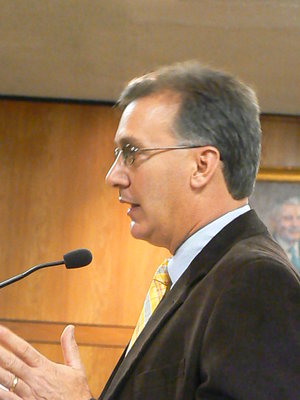Mayor Michael Gonnelli appeared in Trenton on Monday in front of the Assembly Budget Committee and testified for municipalities statewide to get their fair share of municipal revenues collected by the state for energy and utility services.
The state began diverting those revenues to the state budget instead of to cities since the early nineties, but in 2010 the amounts diverted reached dramatic levels.
Gonnelli appeared before the committee along with Mayors Antonia Ricigliano of Edison and John Bencivengo of Hamilton Township, and members of the New Jersey League of Municipalities (NJLM).
The town should have received $3.1 million in 2011, Gonnelli said.
__________
Addressing aid deficit
The mayors said at the hearing that the state should restore $271 million in state aid cut in the fiscal year 2011. The municipal revenues had been used by the state to balance the FY 2011 budget.
The general municipal property relief programs, which are often referred to as state aid, are actually revenue replacement programs, intended to replace property tax relief funding that was formerly generated through taxes assessed and collected locally, according to the NJLM.
Gonnelli told Assembly committee members that Secaucus should have received $3.1 million from the Consolidated Municipal Property Tax Relief Act (CMPTRA) and Energy Tax Receipts Program in 2011, but only received $1.8 million.
Favorable response
Gonnelli said after the hearing that he felt the committee members weren’t aware of the issues surrounding the municipal tax revenues and that the hearing offered an opportunity to provide them with a deeper understanding. He said that their response was mostly favorable.
“Committee members who spoke at the hearing, from both sides of the aisle, seemed to recognize that the time has come to end local taxpayer subsidies of the state budget,” said William G. Dressel, Jr., NJLM executive director. “If that consensus develops, the debate, going forward, will be about the highest and best use of the funding – whether it should be distributed back to local government to provide full funding for vital municipal replacement programs, or sent back to taxpayers in the form of rebates.”
Gonnelli said that if Secaucus received its fair share of state aid, it would be put toward direct property tax relief.
To comment on this story online visit www.hudsonreporter.com. Adriana Rambay Fernández can be reached at afernandez@hudsonreporter.com.
